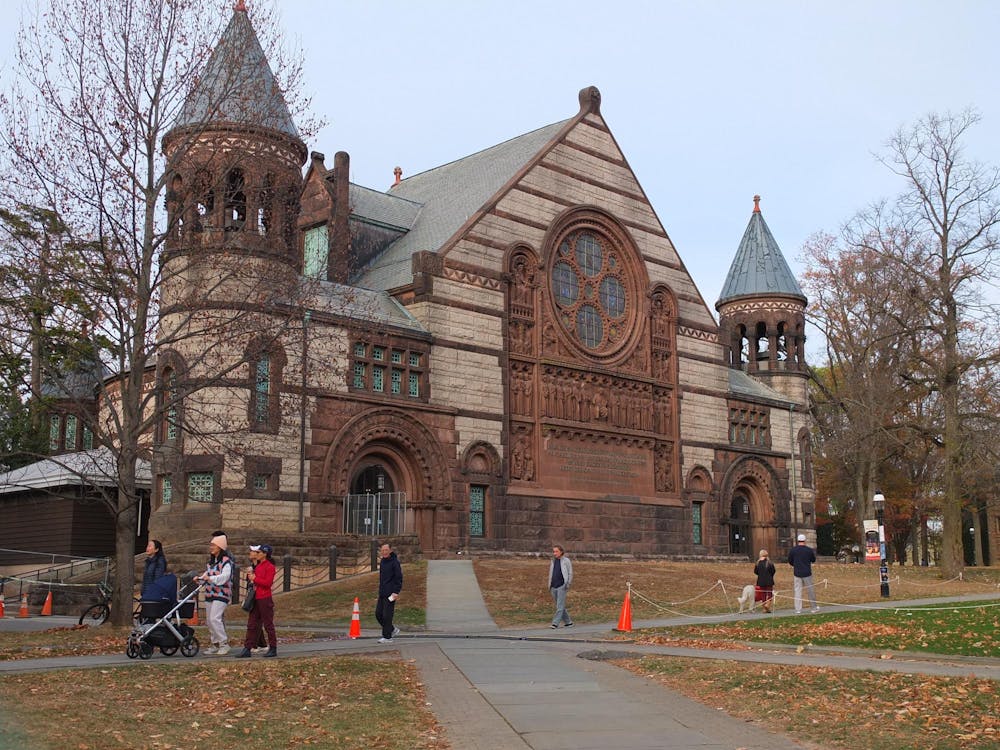Watching Ketanji Brown Jackson speak in Richardson Auditorium last Wednesday, I felt an eerie sense of whiplash as the conversation shifted between heartfelt discussions of the justice’s life story and nervous allusions to a democracy on the brink of collapse.
At one point, Professor Deborah Pearlstein, who was moderating the talk, referenced a recent dissent of Jackson’s, in which she criticizes the Trump administration and the Court’s majority through the lens of Calvinball: “Calvinball only has one rule: There are no fixed rules. We seem to have two: that one, and this Administration always wins.” As Pearlstein read the dissent, Jackson appeared to feign shock at her own dire words, seemingly unsure how to respond. The audience then erupted in nervous laughter.
There was no following substantive conversation about what it means for the administration to always win at the Supreme Court. There were no questions from the audience pressing on Jackson’s recent fiery dissents. The discussion eventually came to whether Jackson believes a hot dog is a sandwich.
Going in, I think most students probably knew that this was not going to be a substantive discussion about the judiciary’s reaction to the current political moment, if only because layered discussion will not take place at a public, staged book promotion in front of a crowd of hundreds and because justices must generally be careful about what they say in public.
So why did so many go to see Ketanji Brown Jackson anyways? Beyond the obvious answer — it’s cool; I was in the same room as a Supreme Court justice — attending the event is an attempt to understand or deal with the current political reality, and, as most knew going in, a completely inadequate one.
In a way, it feels like these students were hoping for some sort of catharsis to emerge from Jackson’s visit that might resolve these anxieties. After all, Jackson’s story as the first Black female Supreme Court justice symbolizes an optimistic, bygone vision of an America that has overcome racism, sexism, and its problematic past. Perhaps she’d have some advice that would illuminate how America finds itself out of this mess.
This uncertainty about how to cope is consistent with Princeton’s culture as a whole. In conversations I’ve had with my peers, many are seemingly unsure how to process or discuss the growing authoritarian threat of the Trump administration, especially when they are so focused on their studies. Resigned humor, instead, has become a common coping mechanism, because authentically discussing the issues feels bleak.
As a community, though, we should honestly acknowledge our bleak feelings on the Trump administration and look for genuine coping mechanisms, rather than compartmentalizing our anxiety into ceremonial events like these.

Many of the Trump administration’s policies stand to existentially and tangibly affect academia and Princeton itself. From international students to disciplines of the humanities, no facet of the American university experience seems like it will be spared in President Trump’s authoritarian attack on academia. These are conditions that, when genuinely confronted, could drive anyone into an anxious spiral. It makes sense that Princeton students would yearn for an event that arguably celebrates a different, more optimistic vision of America.
But, for some students, a headliner talk like Jackson’s might be their only civic event in an entire academic year, considering the numbers that showed up relative to your normal conversation in a School of Public and International Affairs (SPIA) basement bowl or the protest in April that drew a thousand townies but 30 Princeton kids. This reflects a failure — of the community, and the country as a whole — to acknowledge and emotionally reckon with the political reality. Perhaps we need to look toward solutions that will allow us to genuinely engage with, rather than avoid, our political discontents.
At a place as civically oriented as Princeton, one way to engage is to simply take advantage of the University’s wealth of resources. Upcoming events — in and outside of SPIA and the Politics department — already provide various seminars for Princetonians to discuss matters directly and indirectly related to the Trump administration. And the Pace Center for Civic Engagement offers a litany of ways for students themselves to take agency over the political moment and civically engage, such as Service Focus, the Civic Leadership Council, and summer service internships. While I primarily see politically oriented students take advantage of these programs, students of all disciplines and interests should consider exploring them.
And perhaps we need to be more honest with ourselves about our collective anxiety over the state of the country. That doesn’t mean all our conversations need to be fatalistic discussions of fascism’s incoming creep. But it does mean consciously acknowledging our concern about the arc of U.S. politics, rather than making a joke of it or throwing up our hands.

Shane McCauley is an assistant Opinion editor from Boston intending to study Anthropology, History, or English and minor in Computer Science. He can be reached at sm8000[at]princeton.edu.








